- Home
- William Shatner
Captain's Peril
Captain's Peril Read online
CAPTAIN’S PERIL
Other Books by William Shatner
TekWar
TekLords
TekLab
Tek Vengeance
Tek Secret
Tek Money
Tek Kill
Man o’ War
The Law of War
Believe
with Michael Tobias
Star Trek Memories
with Chris Kreski
Star Trek Movie Memories
with Chris Kreski
Get a Life!
with Chris Kreski
Star Trek: Odyssey
with Judith & Garfield Reeves-Stevens
The Ashes of Eden
The Return
Avenger
Star Trek: The Mirror Universe Saga
with Judith & Garfield Reeves-Stevens
Spectre
Dark Victory
Preserver
I’m Working on That
with Chip Walter
This book is a work of fiction. Names, characters, places and incidents are products of the author’s imagination or are used fictitiously. Any resemblance to actual events or locales or persons, living or dead, is entirely coincidental.
POCKET BOOKS, a division of Simon & Schuster, Inc.
1230 Avenue of the Americas, New York, NY 10020
Copyright © 2002 by Paramount Pictures. All Rights Reserved.
STAR TREK is a Registered Trademark of Paramount Pictures.
This book is published by Pocket Books, a division of Simon & Schuster, Inc., under exclusive license from Paramount Pictures.
All rights reserved, including the right to reproduce this book or portions thereof in any form whatsoever. For information address Pocket Books, 1230 Avenue of the Americas, New York, NY 10020
ISBN: 0-7434-5594-0
POCKET and colophon are registered trademarks of Simon & Schuster, Inc.
Visit us on the World Wide Web:
http://www. SimonSays.com/st
http://www.startrek.com
This book is dedicated to my wife.
The captain was in peril, and riding to the rescue, and I mean, really riding to the rescue, this lovely lady cantered into my life.
Peril turned to understanding, and understanding turned to love.
And love turned to…We are right out of a romance novel.
Acknowledgment
Once again, the towering talents of Judy and Gar are prominent in all of these novels.
From rock and tempest, fire and foe,
Protect them wheresoe’er they go;
Oh, hear us when we cry to Thee
For those in peril on the sea!
—“The Navy Hymn”
William Whiting, 1860
CAPTAIN’S PERIL
Prologue
Site 4
BAJOR, IN THE TWENTY-FIRST YEAR OF THE CARDASSIAN DELIVERANCE
“THEY’RE KILLING THEIR OWN PEOPLE!”
Fists clenched, Glin Dukat stared in frozen disbelief as the deadly actinic-blue blossoms of micromatter grenades flashed across the distant excavation site. Debris took tumbling flight like sand churned by raging waters. Ancient clay tablets. Hand-carved stone blocks. Body parts…
Bajorans were slaughtering Bajorans, obliterating their own history, and the young Cardassian soldier could not fathom why.
“Down!”
Dukat gasped as he was slammed into the dust of Bajor, propelled by Gul Atal’s violent tackle. An instant later, the thunderclap of a nearby detonation made his chest shudder, his ears pulse with the endless hiss of static.
But Dukat was a soldier of the Cardassian Empire, never destined to cower in the dirt. He flexed his lateral spinal cords to spread his cobralike neck as wide and as threateningly as possible. Even as the next fist of searing heat struck, he pushed himself to his feet and spun round to see the Cardassian command tent consumed by fire, the tendrils of its fabric streaming upward, lifted by heat and by smoke and by the escaping spirits of his fellow soldiers who had still been at their duty stations inside.
“Why?” Dukat asked.
“Because Bajorans are animals!” Atal growled. Dukat staggered back as he felt Atal rip the communicator from his weapons belt, heard his commander’s harsh voice shout for immediate air support. Then Atal pushed him down again as another grenade transported into position and ignited within meters. The resulting wave of rocks and soil fell on them like an avalanche.
This time Dukat did not attempt to rise. “We’re only trying to help them,” he said.
“But do they respect our sacrifice?” Atal asked. He wiped a stream of black blood from his gray skin, spat into the Bajoran soil. “Do they understand without our selfless aid, they face global catastrophe within a generation? No!”
The slowly fading hiss that had masked Dukat’s hearing now was replaced by distant screams. Familiar sounds of pain and terror. Dukat frowned. Bajorans were so weak, so unwilling to face adversity.
“Where are our fighters?” Atal raged.
Reflexively, Dukat looked up to the skies of Bajor, now darkening with nightfall, and even in the midst of battle he automatically sought the small moving point of light that held his future—Terok Nor, the orbital mining station, now almost complete. He’d made up his mind it would be his next posting. In time, perhaps, his first real command. But there was no sign in those skies of the orbital fighters from the Cardassian Aid Armada. Which meant there could be no hope of deliverance from the crazed Bajorans who’d dared attack their benefactors, and their own kind.
Another explosion, even louder.
The transported grenades were coming closer to Dukat’s position.
Still crouching beside his commander, Dukat drew his disruptor, thumbed it to full power, preparing for combat. “Why attack like this?” he asked Atal. “Why not hit the camp first, then the excavation?” This Bajoran strategy made no sense to Dukat, unless the Resistance leaders had confused their order of battle and had attacked their targets in the wrong sequence.
“Why attack the excavation at all?” Atal drew his own weapon, rolled on his side to adjust its setting. “Two hundred prisoners working in it! Two hundred of their own people! I’ll tell you why! Bajorans are animals, Dukat! Never forget that!”
Black eyes glinting beneath the gray knots of his brow, Atal rapidly scanned their surroundings, then pointed to a small mound of soil left over from the digging of the prisoners’ latrine. “There,” he ordered. “Take cover!”
Dukat responded to his training as befitted a soldier of his rank, scrambling to his feet and running toward his objective even before his mind had consciously registered his commander’s order.
Every sensation was clear to him as he crossed the open, exposed terrain, knowing he could draw fatal fire at any moment. More grenades, more explosions. The impact of his boots on hard, dry soil. Atal’s heavy footsteps behind him. The scorched scent of flames and death. Despairing wails from those not killed at once.
He reached the mound, dove over it, rolled into a crouch. And without thought or hesitation, jammed the emitter node of his disruptor deep into the side of the Bajoran he found huddled there—Rals Salan. More than a boy, not yet a man. Once a trustee. Now, the enemy. Deserving no mercy.
“You didn’t inform us,” Dukat said. “That was your job!”
Rals jerked away, but Dukat grabbed his shoulder. “You’ve failed us!” He tightened his grip until he saw tears of pain glitter in the prisoner’s eyes, trickling into the ridges of his nose.
Two more explosions flashed nearby. Atal rolled over the mound of soil, sliding into position beside Dukat.
“I didn’t know about th
e attack,” the Bajoran gasped.
Falling dirt dropped around them like solid rain.
Without prompting from Atal, Dukat shoved his disrupter even deeper into the Bajoran’s side. “I don’t believe you.”
“Please…” Rals’s voice trembled.
Dukat’s hand moved from the trustee’s shoulder to his neck, a shift from a position of pain to one of pending death. “Then tell the truth now. Why are your own people attacking the excavation?”
The young man’s hesitation gave Dukat part of the answer he needed. There was no confusion at work here, no mistake had been made. The Bajoran Resistance had deliberately attacked the excavation first, leaving the base camp and its Cardassian guards for a second assault. Now, he needed to know why.
Dukat thumbed the disruptor down to its lowest setting, took his hand from Rals’s throat, then fired with the emitter still in contact.
Rals shrieked with agony as the disruptor’s minimum-power discharge flooded each of his nerve endings with fiery pseudopain. Beside Dukat, Atal smiled with approval.
“Answer me,” Dukat said. “Why?” He thumbed his disruptor one setting higher, the click audible against the trustee’s ribs.
“They’re…they’re protecting the Prophets’ Tear,” Rals sobbed.
Dukat blinked, confused. “An Orb?” He sensed Atal’s attention sharpen.
Rals nodded, eyes tightly shut with pain.
Dukat persisted. “But…there’s no such thing.” He shook the Bajoran roughly to force him to explain his answer. It was inconceivable that the Bajoran Resistance would forgo a successful sneak attack in order to blow up a…a child’s tale of fantasy.
Rals’s eyes opened. Though the Bajoran was still shaking, his voice was sincere. “No weapon can destroy a Tear from the Temple,” he said. “The bombs are to hide it. To protect it until the Prophets drive you from our world.”
“Kill him,” Gul Atal said.
Again, as he had been trained, Dukat reflexively thumbed his disruptor to neural discharge, setting three. Strong enough to kill at this range, but not enough to disintegrate. At such close quarters, lying here in the dirt, he had no desire to fill his lungs with the mist of disassociated Bajoran.
It was clear Rals Salan knew what his fate would be. “No!” he pleaded. “I can still serve you! I just didn’t know what they planned!”
Dukat’s view of Bajorans differed from that of his commander’s. He had come to consider most Bajorans to be like children. Children who had never experienced the true love and guidance of discipline. So now, perhaps because he himself was young, or perhaps because he was only a glin with an idealistic view of the possibilities of life, Dukat uncharacteristically turned to his commander for confirmation of the terminal order. Would not any Cardassian give a wayward child a second chance? And Rals Salan had proven himself to be an efficient informer in other matters.
“He has served us well in the past,” Dukat began.
Then he instantly regretted that he had.
Gul Atal’s neck spread in outrage. “I gave you an order!”
Dukat felt his finger tighten on the activation control of his disruptor. Still, he couldn’t help himself from adding: “He can’t help what he believes, sir, no matter how foolish.”
Atal’s dark eyes were so opaque, so uncommunicative, that for a moment Dukat wondered if his own life were at an end.
Then he sensed the truth his commander’s neutral expression sought to conceal from him.
The Orbs are real.
The legends, the rumors, the childish tales of mystical hourglass Orbs sent from the Celestial Temple to the true believers of Bajor. A source of infinite knowledge. The ability to see into the past, into the future. The means by which a single Cardassian could rise above the Central Command, above even the Obsidian Order itself. Absolute power…absolutely true.
“There is an Orb in the excavation?”
As if watching through someone else’s eyes, Dukat tracked Atal’s slow and methodical movement as he drew his own disruptor.
The only response Dukat knew he could make would be to confess his mistake. Quickly. To loudly proclaim the official truth as promulgated by Command: There were no Bajoran Prophets. There were no Orbs. Bajorans were superstitious animals and their unfounded belief in supernatural beings must be eliminated if their backward world ever hoped to be uplifted to the status of a Cardassian protectorate.
But even as those self-serving words coursed through Dukat’s mind, he again realized the full truth known by his commander. The truth of the Bajoran Orbs, and the orders given his gul to eliminate any lesser soldier who discovered that truth.
With regret, and anger, Dukat knew he was incapable of doing anything but seeing this through to the end.
“They’re real, aren’t they?” he asked. The question was foolish but it had to be asked.
“I am sorry, Dukat.”
For a moment, Dukat almost believed his commander.
But the moment was broken by multiple sonic booms.
Dukat recognized the sound. Orbital fighters. Shedding velocity, coming in toward Site 4 and the excavation in graceful, S-shaped curves.
Dukat, Atal, and Rals stared skyward as multiple plasma-exhaust streams blazed against the night and the few bright stars already risen over Bajor.
When Dukat looked back at Atal, his commander’s disruptor was still drawn.
“I will not tell anyone,” Dukat said honestly.
“I know,” Gul Atal agreed, as if with sadness. “You had promise, Dukat.”
Dukat’s throat tightened.
The scream of the orbital fighters increased in intensity.
“I would like to see our people win,” Dukat said with some difficulty.
Gul Atal nodded almost imperceptibly, and made no further move to carry out the execution.
Knowing he was now taking his last breath, thinking his last thought, Dukat turned to gaze out at the dark plain of the excavation site where an ancient city lay hidden by meters of soil. He waited for the shimmering particle curtains to erupt among the Bajorans who led the attack there.
The orbital fighters, unseen, but heard, streaked closer now, the whine of their engines swelling to the rumble of a storm.
Dukat understood what his commander was doing—Atal was permitting his glin to see the first weapons discharge before consigning him to the void.
Dukat appreciated that final gesture. With luck, the spectacular sheet of an unbound particle curtain would be the last thing he saw. Cardassia’s defeat of the resistors would be the last thing he would experience.
Could be worse, Dukat thought, using all his training to fight his instinctive need to run, to hide, to do whatever he could to escape an unfair death.
Then he became aware that the sound of the orbital fighters had reached its peak, and was now diminishing again.
“They didn’t deploy their weapons.” Dukat was puzzled. For a moment, he forgot he was about to die. For a moment, he followed the glowing dull purple streaks of the fighters’ passage through the atmosphere, found himself looking in the same direction as Gul Atal, who seemed to have forgotten him.
“No,” Atal said. “They wouldn’t…”
Though he would have liked to know what Atal meant, Dukat decided against asking what it was the fighters wouldn’t do. If he stayed out of Atal’s thoughts for a few minutes, perhaps even seconds, he might just claim a reprieve.
Then the first blinding blue curtain of light blazed through the darkness. Far in the distant foothills. Shimmering like an aurora dragged to earth.
There was only one explanation for Dukat, and death sentence or not, he had to say it: “The dam.” The pilots in the orbital fighters had clearly received their authority from a level of command far above Gul Atal’s.
Dukat stifled the impulse to laugh. By destroying the dam, the whole valley would be flooded a month ahead of schedule. Instead of a controlled and gradual release that would preserve the topogra
phy and allow indigenous animal life to escape, the valley would be gone in an hour. Along with all evidence of the battle fought here, Bajoran butchers and Cardassian peacekeepers combined.
Dukat savored the gift of the unexpected.
“No one will ever know what happened here,” he said to Atal.
“That’s the point, Dukat.” The gul looked grim. It was evident to Dukat that he and his commander had both reached the same conclusion. They were all expendable now.
Once more, thought was not required. Only a soldier’s instinct.
Dukat swung his hand out and fired his disrupter, its energy bolt targeting Atal’s wide neck, the flickering web of disruptive energy claiming his body.
Atal dropped with a strangled cry. A cry of pain, Dukat knew, but not of surprise. A gul of Atal’s experience certainly would understand what his glin had done.
“You…you killed him,” Rals Salan gasped, astounded.
“Not yet,” Dukat said as his commander moaned. “The water will take care of that.”
He aimed his disrupter at the Bajoran trustee. “And you,” he added, then fired again.
Rals Salan writhed once, then was still.
“Animal,” Dukat said. Atal had been right. Bajorans were beasts who killed their own. He would not be so soft in future. Or so foolish a second time.
Dukat felt the ground begin to tremble beneath him, and through the twilight he glimpsed figures at the excavation as they began to run.
Then, to the north, growing from the mountains where the Bajoran fighters had loosed their weapons, he saw the outline of a dark and roiling shadow. The pent-up waters had been released.
The flood was coming.
Dukat did not move to follow the retreating Bajorans. He knew they could not outrun what pursued them. At least, not in the direction they were headed.
He turned and ran the other way. To the east. Like any trained soldier, heading for higher ground. His stride was even, his breathing as precise as any machine. No thought given to the growl of the rushing torrent chasing him, except to take comfort in knowing it would erase all he left behind.

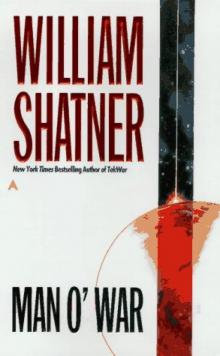 Man O' War
Man O' War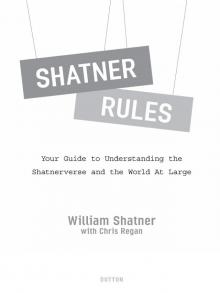 Shatner Rules
Shatner Rules Leonard
Leonard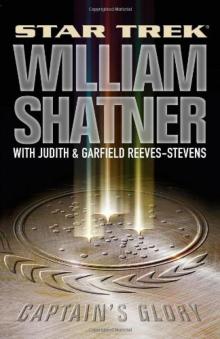 Captain's Glory
Captain's Glory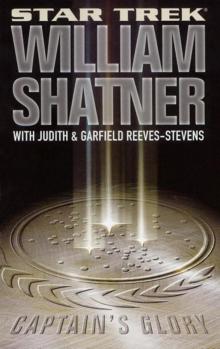 Captain's Glory зпвш-9
Captain's Glory зпвш-9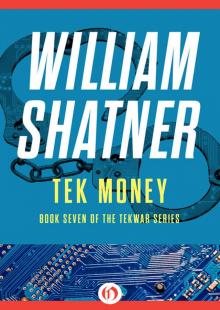 Tek Money
Tek Money Spirit of the Horse
Spirit of the Horse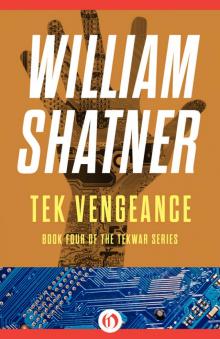 Tek Vengeance
Tek Vengeance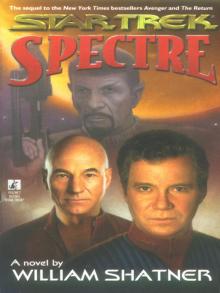 Spectre
Spectre Zero-G
Zero-G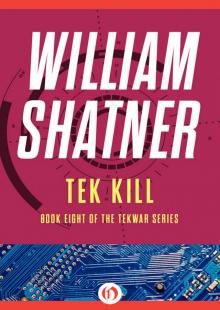 Tek Kill
Tek Kill Collision Course
Collision Course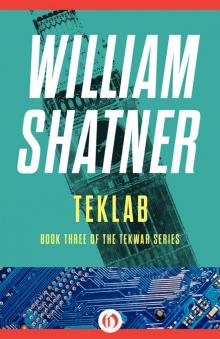 TekLab
TekLab Up Till Now
Up Till Now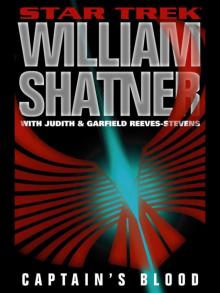 Captain's Blood
Captain's Blood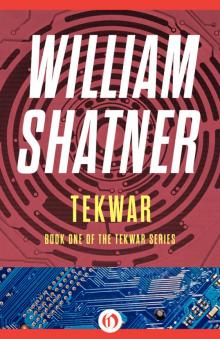 TekWar
TekWar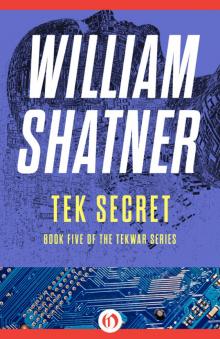 Tek Secret
Tek Secret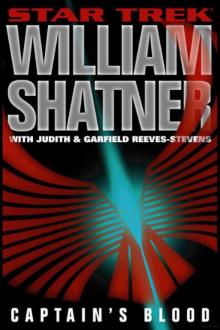 Captain's Blood зпвш-8
Captain's Blood зпвш-8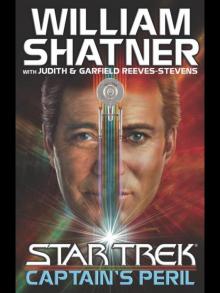 Captain's Peril
Captain's Peril Live Long and . . .
Live Long and . . .